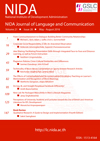Technicality of Noun-Noun Combinations in Sports Science Research Articles
Keywords:
Noun-Noun Combinations, Vocabulary Classification, Sports Science, Exercise Physiology, English for Academic PurposesAbstract
The authors of this paper aimed to study the role of Noun-Noun Combinations (NNCs) in academic discourse, in a particular branch of sports science, exercise physiology. It began with the creation of an Exercise Physiology Research Article Corpus (EPRAC). The corpus, which consisted of 41 journal research articles in the discipline giving a corpus size of approximately 134,029 running words, was compiled. Nouns occurring at least three times in the corpus were selected for investigation, and found that they have a strong tendency to combine in NNCs, a process central to the creation of technicality in the corpus. A total of 2,010 NNCs types were identified, comprising more than 22% of all the word types in the corpus. These NNCs were classified by experts in the field according to how closely or exclusively they are related to the field of exercise physiology (how technical they are). It was found that over 75% of the NNCs are technical. Technical NNCs occurring at least three times were included in the Exercise Physiology Research Article Corpus Noun-Noun Combination List (EPRACNL). The list consists of 417 technical NNCs. The NNCs in the list are vital to sports science learners for academic texts comprehension especially research articles. They are also an essential part of sports science course designed to teach graduate students how to understand published research in this field.
Downloads
How to Cite
Issue
Section
License
By submitting a manuscript, the author transfers the copyright for the article to School of Language and Communication, National Institute of Development Administration (NIDA), if and when the manuscript is accepted for publication. Though the journal is an open-access, reproduction of any material published in NIDA Journal of Language and Communication for non-personal and/or commercial purpose requires a written permission from School of Language and Communication, National Institute of Development Administration (NIDA).






